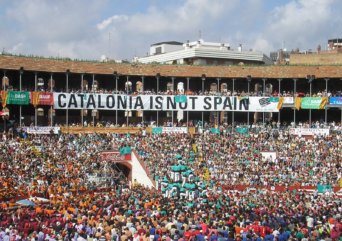- About
- Topics
- Picks
- Audio
- Story
- In-Depth
- Opinion
- News
- Donate
- Signup for our newsletterOur Editors' Best Picks.Send
Read, Debate: Engage.
| located: | Spain |
|---|---|
| editor: | Maria João Morais |
When Catalans took to the streets to vote in a non-binding referendum on November 9th 2014, the atmosphere was festive. Peacefully, entire families queued for hours to cast their vote. The poll, banned by the Spanish Constitutional Court, became mainly a symbolic act aimed to measure the strength of Catalan support for independence.
Three years on, and after a decade of growing tensions between Madrid and Barcelona, the atmosphere expected for Sunday 1st of October, the date set for a new referendum on independence, is anything but a celebration.
To be carried out in defiance to Madrid’s unwavering stance on refusing such a poll, the upcoming vote has provoked a heightening of tensions that few imagined possible in a country like Spain. To prevent the vote they consider illegal, the conservative government of Mariano Rajoy has already seized control of the devolved Catalan finances and placed the regional police under the command of the Ministry of the Interior of Spain. In an unprecedented police operation, 14 senior Catalan officials were detained and 9.8 million ballot papers were confiscated.
However, these improvised measures do not solve the political problem, instead only elevate the institutional confrontation, as the independence challenge grows and strengthens, determined to see ballot boxes put out this Sunday.
Once again, the reaction from Madrid has aggravated the side of those who wish to split from Spain. The issue of Catalan independence is a direct result of the strengthening of Spanish nationalism, particularly from the ruling Popular Party, which refuses to accept the plurinationality of the Spanish state, ruthlessly rejecting the possibility of allowing the Catalans to decide their future in a legal referendum, similar to the one held in Scotland in 2014. Constantly referring to Spanish laws and the country’s Constitution, Rajoy’s Government forgets that throughout history laws have been altered based on popular will and that nowadays democracy should be the only way to resolve conflicts.
Nonetheless, the independence sector in Catalonia has also shown little will for dialogue and creating consensus, an attitude that is now threatening the cohesion of Catalan society. With both sides becoming increasingly polarised, it seems likely that the conflict can only be resolved once current protagonists are replaced by more moderate leaders willing to engage in dialogue. Otherwise, dire consequences seem inevitable.
